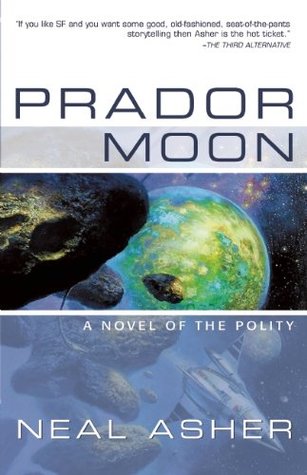 When I received Asher’s latest in my mailbox, my first thought was that it looked a little thin. I checked the number of pages: 222. Uh oh, I thought. This isn’t going to last me very long. And it didn’t. Although his books are usually over 500 pages, Asher’s novels are always very fast reads for me. He has this habit of making me keep on reading until I finish or am forced to stop, possibly by a chorus of horns from behind me, alerting me that the light has turned green.
When I received Asher’s latest in my mailbox, my first thought was that it looked a little thin. I checked the number of pages: 222. Uh oh, I thought. This isn’t going to last me very long. And it didn’t. Although his books are usually over 500 pages, Asher’s novels are always very fast reads for me. He has this habit of making me keep on reading until I finish or am forced to stop, possibly by a chorus of horns from behind me, alerting me that the light has turned green.
I wondered how he would handle a shorter novel, and of course, he handles it very well. Being less than half the size of most of his works, the story necessarily has a more narrow focus, but Prador Moon has the usual multiple characters and converging storylines, and he maintains his high ratio of punch per x number of words. This story is somewhat of a prequel to his previous books, The Skinner and The Voyage of the Sable Keech, which included encounters between the Polity and the advanced and violent alien race known as the Prador.
The back cover of Asher’s latest has the heading, “It’s first contact . . . Polity style!” If you guessed that involved tea and crumpets, you’re slightly off the mark. The opening chapter describes the first meeting between Prador emissaries and a human Polity ambassador, the latter being promptly lifted by one claw belonging to the former, and then snipped in two. The first diplomatic meeting between the two races thus marks a bloody and explosive beginning to total war.
The rest of the novel finds the Polity scrambling to militarize their society and put up a resistance against the aggressive and uncompromising Prador forces. Jebel Krong is part of the security for the initial inciting event and somehow survives. He and a band of other veterans of the initial incident become a sort of special forces unit against the Prador, clashing with them again and again throughout the novel as they try to slow down their progress across systems.
At about the same time, a woman named Moria is the last to receive, unwittingly, an illegal and advanced new aug from a fugitive doctor. This cerebral implant has become a necessity in order for her to make any further progress in her career as a Runcible technician (the exceedingly complicated faster than light gateway technology that only its late creator was able to understand, briefly, before going insane and dying). However, she finds out before too long that her aug is definitely not a standard model, and the Trajeen System Cargo Runcible AI, sometimes called George, is very interested in just what she may be able to do with it.
The Polity’s only major battleship, the Occam’s Razor, which has been acting as a transporter, is quickly called back into active service, but since it pre-dates the AI’s Quiet War — wherein humans were effectively given the boot politically, and AIs took over the top governmental posts so we’d stop blowing ourselves up — it includes a built-in failsafe wherein a human captain must be plugged into the systems to give weapons permissions and things like that. Tomalon, whose academic background has been focused on human-AI synergy, has been waiting for this posting all his life. Together and consciously-linked, captain and ship head out to meet the Prador in battle.
The action is non-stop, and Asher doesn’t overburden us with exposition. We get to know characters from actions exclusively, and personal histories and backgrounds rarely exceed one or two lines. We are focused always on the here and now.
I have to give him the most credit for the Prador themselves. Though unambiguously evil from a human perspective, these villains are not at all one-dimensional. A good portion of the story is told from their perspective, and we glean details of a very plausible, very extensively-developed alien society. Who says sapience necessitates empathy? Who says an advanced society must have achieved moral superiority, mutual respect, and long-lasting peace? Have not our greatest advances occurred as a result of war? Does not competition drive us to greater heights? The Prador are monsters in every human sense of the word, and the evolution of their society is the natural result of each individual’s need for power and survival, and a complete disregard for the welfare of others. This includes their own children, who are controlled via natural and technological means, and destroyed with impunity as they near maturity, before they can become potential competitors. Cannibalism is the norm.
Evil alien monsters, space battles, cybernetic humans . . . this might seem, at first glance, to be classic space opera. But it’s so much more than that. Neil Asher’s future history is a product of its technology: human augmentation; artificial intelligence; faster-than-light travel. The implications of these developments — socially, politically, morally — make his universe what it is. There’s much to plumb here, and I don’t see this series running out of steam anytime soon. Prador Moon makes another worthy addition. Recommended.
(Night Shade Books, 2006)
